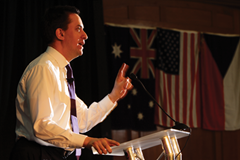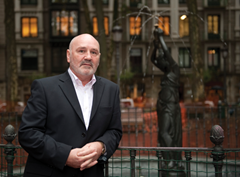Labour and Northern Ireland elections
 Labour considers election rights
Labour considers election rights
Labour has agreed to open talks on contesting elections in Northern Ireland, after pressure from local party members. They see this as a natural next step after the party allowed Northern Ireland residents to join (2003) and the formation of a Northern Ireland Constituency Labour Party (NICLP) in 2009. Local branches of the Fabian Society, the Co-operative Party and Labour Students have also been established.
“I’m encouraged by what I’m hearing,” NICLP secretary Boyd Black told agendaNi. He found a “definite interest” in the idea but the party also wanted to ensure that the peace process continued on track. Black contends that Labour can take the process to its next stage by running candidates.
“In a democracy, a prospective Party of Government should seek a mandate across the UK, including Northern Ireland,” the NICLP states in its submission to the ‘Refounding Labour’ review. The first Labour Party conference was held in Belfast in January 1907.
Labour would designate itself as ‘other’ as members come from a variety of political backgrounds. It disagrees with the SDLP’s nationalism and points out that neither Alliance nor the Greens have trade union links.
To build a shared future, Labour would focus on social and economic issues, and aim to appeal to disillusioned voters and those who want another non-sectarian alternative. Initially, it would contest Assembly and local elections. In the longer term, it may also run for Westminster and the European Parliament.
High profile supporters for the move include Andy Burnham (currently Shadow Education Secretary) and former Home Secretary Alan Johnston. Burnham spoke in favour of contesting elections at the Labour Party Irish Society’s fringe meeting.
There is no timescale on the talks and the final decision will be taken by the National Executive Committee, influenced by the party leader. agendaNi contacted Ed Miliband’s office for his view but had not received a reply by the time of going to press.
 Fuel poverty prioritised at Stormont
Fuel poverty prioritised at Stormont
The Assembly’s Social Development Committee has agreed to speak to other Assembly committees to find “workable solutions” to end fuel poverty in Northern Ireland. Collectively, they will put pressure on departments to take more action. The Department for Social Development is drawing up a new fuel poverty strategy.
Committee Chair Alex Maskey commented: “The recent hike in energy prices combined with our reliance on expensive home heating oil clearly makes the problem worse and dramatically increases the number of people affected by fuel poverty, particularly as we enter the colder winter months.”
Maskey accepts the Fuel Poverty Coalition’s view that more than 300,000 households (at least 44 per cent of the population) experience fuel poverty. However, the DSD says that the figure stands at 13 per cent (or 75,000 households), based on research from the University of Ulster. Both the coalition and department agree that the province has the highest rate of fuel poverty in the UK.





